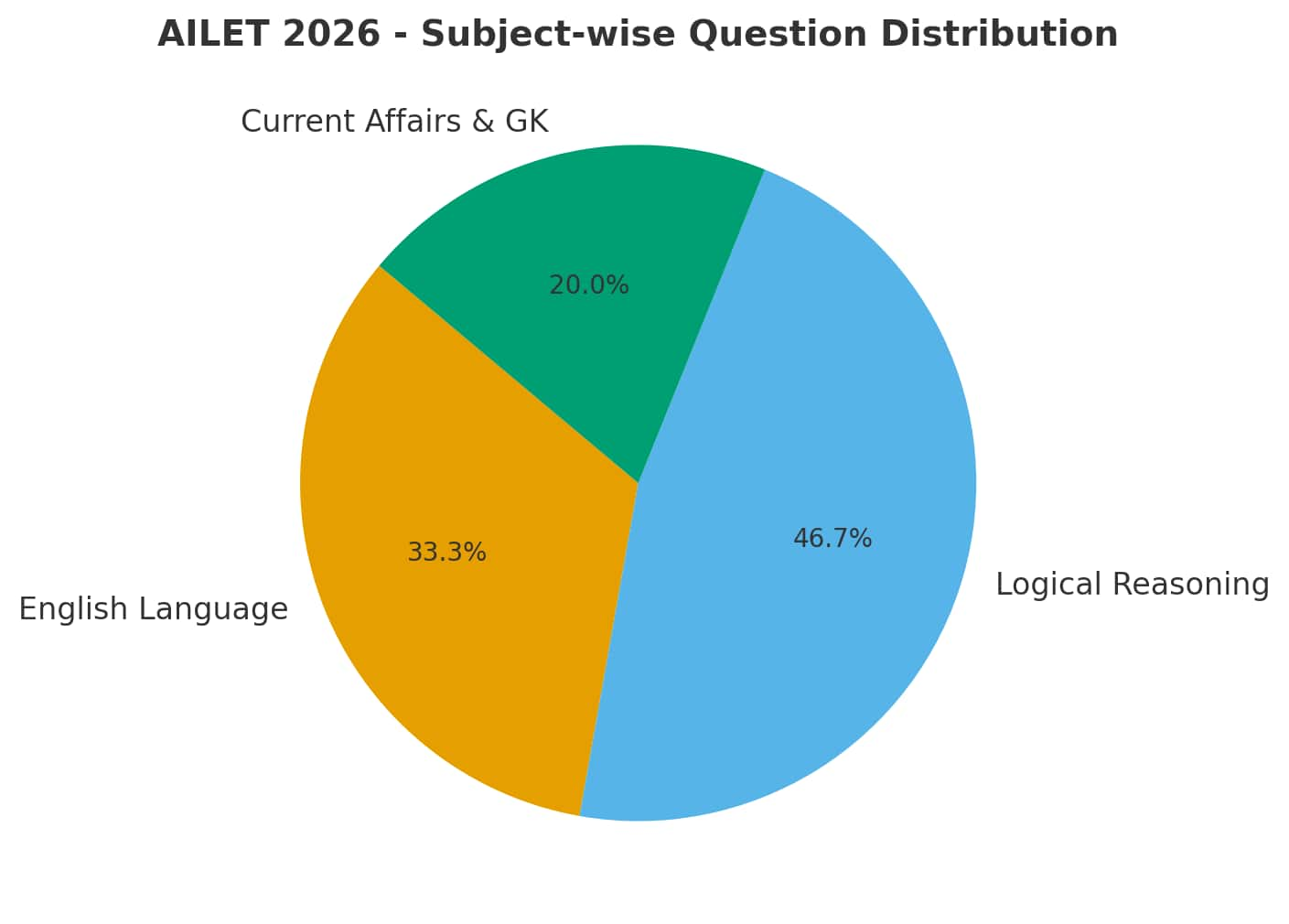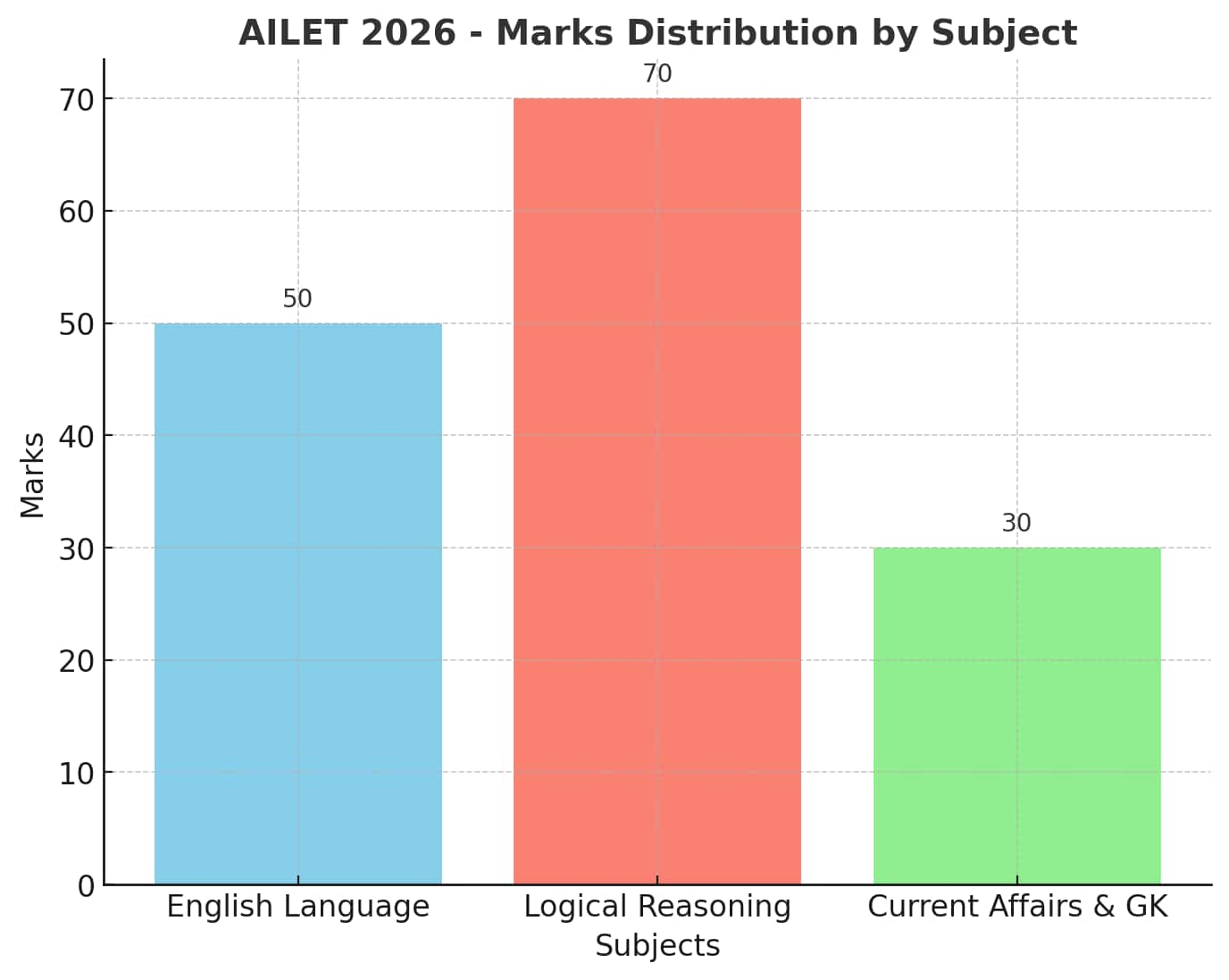Jindal Global Law School Admissions 2026
Ranked #1 Law School in India & South Asia by QS- World University Rankings | Merit cum means scholarships | Early Admissions (Pahse 2) Deadline: 28th Feb’26
Do you intend to take the AILET 2026? If so, you have to understand how crucial the General Knowledge (GK) portion of the test is. Check out this article for easy preparation ideas and strategies for the general knowledge and current events sections of the AILET 2026, as well as the Exam Pattern.
This Story also Contains

AILET Notification Out! NLU Delhi will conduct the AILET 2026 exam on December 14, 2025, from 2 pm to 4 pm. One of the most crucial portions of the exam is the AILET GK 2026 portion. It can also make or break your prospects of being accepted into a prestigious law school. So, the secret to success in this area is preparation. We'll talk about some preparation techniques and advice in this blog post to assist you in getting ready for the AILET GK 2026 part.
A concentrated and methodical approach is necessary to do well in the AILET 2026 General Knowledge and Current Affairs part, which may consist of 30 questions for 30 marks out of 150 questions. Given the variety of themes, strategic preparation strategies for AILET GK Current Affairs are vital. This component is crucial since it allows you to save time, which you can use in more difficult areas like logical thinking.
The AILET Exam Pattern 2026 will have 150 multiple-choice questions (MCQs) on the AILET exam, each worth one mark. A negative mark of 0.25 is also applied for each incorrect response on the exam.
| Subjects | No. of Questions | Maximum Marks | Time Allotted |
|---|---|---|---|
English Language | 50 | 50 | 2 Hours |
Logical Reasoning | 70 | 70 | |
Current Affairs & GK | 30 | 30 | |
Total Marks | 150 Marks | ||
According to the AILET syllabus 2026, the list of the following important topics will fall under the AILET GK syllabus 2026 specifically. The list is given below.
Topics | Description |
|---|---|
Current Affairs |
|
Static GK |
|
History |
|
Geography |
|
Science and Technology |
|
Economics |
|

This makes it easy to see that Logical Reasoning carries the highest weight, followed by English Language and Current Affairs & GK.

An essential section to understand what NLU Delhi repeatedly asks.
Year | Difficulty | Major Focus Areas |
2021 | Easy–Moderate | Awards, sports, constitution, and appointments |
2022 | Moderate | IR (India–World), economics, Supreme Court cases |
2023 | Moderate | Science news, books & authors, climate updates |
2024 | Moderate–Tough | Government schemes, economy, legal CA |
2025 | Moderate | International relations, polity, sports |
Given below are the most expected GK Topics for AILET 2026, based on the last 5 years:
Ranked #1 Law School in India & South Asia by QS- World University Rankings | Merit cum means scholarships | Early Admissions (Pahse 2) Deadline: 28th Feb’26
Among top 100 Universities Globally in the Times Higher Education (THE) Interdisciplinary Science Rankings 2026
In AILET exam preparation 2026, the GK section plays a crucial role since out of all the sections, this section is the most scoring and can help students to score good marks in the exam. However, preparing for the General Knowledge (GK) section of the All India Law Entrance Test (AILET) requires a well-thought-out approach that emphasises current affairs and static portions. The below AILET GK Preparation Tips 2026 will assist you in preparing for the AILET 2026:
Know the syllabus: To comprehend the subjects that could be presented in the GK portion, familiarise yourself with the AILET curriculum. This will assist you in planning your study schedule. This year, there will be about 30 questions in the GK part, covering about 5 passages.
Read newspapers and magazines: Remember that questions in the GK part don't always come from the static GK, so don't rely only on it for the AILET test. To stay up to date on important events and current affairs, make it a habit to regularly read journals and newspapers such as The Hindu, The Economic Times, The Indian Express, etc. Pay particular attention to local and international news as well as politics, economics, sports, science, and technology.
Ranked #18 amongst Institutions in India by NIRF | Ranked #1 in India for Academic Reputation by QS Rankings | 16 LPA Highest CTC
India's Largest University | BCI approved | Meritorious Scholarships up to 5 lacs |
Visit reputable websites: For up-to-date information, follow reputable news portals and websites. Websites with extensive news coverage, such as GKtoday, The Hindu, The Indian Express, and numerous more, are well-liked.
Watch news channels: To be informed about current events and significant concerns, watch news channels regularly. Additionally, this will help you become more knowledgeable about both domestic and global happenings.
Solve past years' papers: Work through past years' AILET papers to get a sense of the exam structure and the kind of questions that are asked throughout the GK section. This might help you identify your weak points and work on them.
Make flashcards: To make it easier to review and remember significant dates, events, and facts, create flashcards for them. Keep them close at hand so you can make revisions anytime you get a moment to yourself.
Make use of Internet resources: For GK preparation, check out websites like AffairsCloud, Jagran Josh, and GKToday, which offer daily updates and study resources.
Revise regularly: Regular review is necessary for GK to retain the information. Allocate a certain period every day for revising, and be sure to revisit key subjects often.
Books, authors, sports, industry, general science, history, politics, science, and technology are all included in the GK section.
International Affairs: Significant international interactions, summits, conferences, treaties, and world events.
National Affairs: Recent government plans, policies, legislation and acts approved by the Parliament, important Supreme Court and High Court judgements.
Science and Technology: Current technological innovations, discoveries, inventions, and improvements.
Economics and Finance: Key economic statistics, budget highlights, economic surveys, and RBI policies.
Sports: Important sporting occasions, honours, and distinctions.
Indian Polity: The Indian Constitution, the Union and its territory, the legal system, and fundamental rights and obligations are all covered.
Geography: The world's and India's physical, social, and economic geography.
Environment: Climate change, biodiversity, conservation, and environmental challenges.
Economy: Fundamentals of the banking, finance, and economy of India.
History: Significant figures, movements, and occasions in Indian and global history.
Art and Culture: Indian culture includes paintings, music, literature, dance, traditional and classical arts, and significant UNESCO World Heritage Sites in India.
Out of all the AILET Books, given below are the most preferred AILET GK Books specifically for the preparation of this section.
Books | Author |
|---|---|
General Knowledge (Latest Current Affairs & Who's Who) | RPH Editorial Board |
Lucent’s General Knowledge | Lucent |
Economic and Political Weekly | Sameeksha Trust |
Current Affairs Yearly | Arihant Experts |
It takes dedication, regular practice, and a well-planned study plan to prepare for the AILET test. level of questions (the complexity of the questions varies depending on the exam, however a deeper comprehension of the subjects is expected.
You may also check -
Frequently Asked Questions (FAQs)
The course must receive at least 50% of their total points from the 10+2 exam. The AILET 2026 test does not have an upper age limit.
The purpose of AILET 2026 GK & Current events is to assess candidates' understanding of a variety of static and current events themes. This section's questions were all multiple-choice, with a possible score of thirty.
Organise the curriculum: Begin by becoming acquainted with the curriculum for the test. Gather Study Resources: Collect the study materials you'll need, including last year's test questions, reference books, and textbooks.
For AILET applicants, a score in the 90–100 range is typically regarded as a "safe score."
Your AILET preparation plan will also need to keep up with current national and international events, as AILET is the sole route to an esteemed university such as NLU Delhi.
On Question asked by student community
hello,
Yes, with 110 score and in SC Category your chances of getting seat is high. You can get more details about the cutoof by following the link attached.
LINK: https://law.careers360.com/articles/ailet-cutoff
I hope it helps!
Hello,
With your score of 110, the chance for AILET is high for the SC category because approximately the expected cut-offs are often 48 to above 55. If you do not recive an invitation try to check the NLU Delhi portal for your rank and email.
I will attach the
HELLO,
Below i am attaching the link to download ALIET PG previous year question papers from 2018 to 2024 with solutions.
Here is the link below :-
https://law.careers360.com/articles/ailet-pg-previous-year-question-papers
Hope this will help you!
With a score of 121 marks and an AIR of around 1000 in AILET 2026, getting admission to NLU Delhi for the BA LL.B (Hons.) program is not possible under the general admission process. NLU Delhi admits students strictly based on AILET rank, and the closing ranks are usually within
A score of 121 marks in AILET 2026 is a good score, but admission to an NLU depends primarily on your All India Rank, not just marks. With an AIR of around 1000, admission to NLU Delhi is highly unlikely under the general category.
NLU Delhi has:
Very limited seats
Among top 100 Universities Globally in the Times Higher Education (THE) Interdisciplinary Science Rankings 2026
NAAC A+ Accredited | Among top 2% Universities Globally (QS World University Rankings 2026)
Admissions open for B.A. LL.B. (Hons.), B.B.A. LL.B. (Hons.) and LL.B Program (3 Years) | School of Law, MRU ranked No. 1 in Law Schools of Excellence in India by GHRDC (2023)
Excellent curriculum; an impressive range of electives, besides core law courses. Up to 100% merit scholarship on a first-come, first-served basis
Moot Court | Mock trials | Legal Aid Clinic
NAAC A++ Accredited | Ranked #11 by NIRF